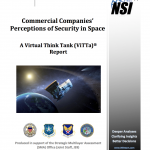Commercial Companies’ Perceptions of Security Space

[Q6] How do commercial ventures think about the security of their space assets during peacetime, crisis and conflict? Do industry leaders think about warfare in or through space differently than military leaders? What are their main concerns? How reliant are they on governments for warning or protection of space? What are their threat priorities?
Author(s): Nicole (Peterson) Omundson (NSI, Inc.)
Summary Response
The expert contributors suggest that commercial companies’ understanding of security is fundamentally different than that of military leaders. For both, security concerns reflect their primary interests; however, as their primary interests and goals are divergent, so are their perceptions of security and threat. When synthesizing the contributors’ responses, it becomes apparent that there is a relationship between commercial actors’ key interests, their security concerns and vulnerabilities, and their expectations regarding US government warnings and protection. This relationship is captured in Figure 1 below.
According to the expert contributors, commercial space companies’ key interests are maintaining business operations, continuity of revenue, continuity of growth, and continuity of profitability. Their main concerns, therefore, are any and all actions or conditions that may threaten business operations and revenue and profitability—natural, accidental, or intentional. Furthermore, intentional actions can be the result of commercial sabotage or conflict.
Interests and Threat Perceptions
The contributors indicate that we cannot think of commercial entities in the same way that we think about the national security space (NSS) community. Commercial space companies are primarily motivated by financial success,4 whereas NSS is focused on security matters. Consequently, commercial perceptions of “security” are rooted in the potential of any situation or action (intentional or accidental) to threaten profitability.
Commercial companies are also involved in different activities than governments. They often have international customer bases and, consequently, multiple roles and ties to uphold, many of which differ from those of the government (Bryce Space and Technology). Contributors from Bryce Space and Technology explain how companies often adopt an international perspective because of their global clientele:
Typically, if you’re operating a satellite business, you have an international perspective. So, with respect to the consequences of conflict or pre-conflict activities, those industry leaders are going to interpret them differently and bring different and useful perspectives to the table because they will see how those actions or situations will affect their broad business base, which is a global business base.
As several contributors note,5 commercial space companies are not all the same; they vary in size, in the types of services they provide (i.e., satellite manufacturers, satellite launch companies, etc.), and in the clients to which they provide those services. These three factors, along with commercial companies’ specific activities, shape their vulnerabilities. These vulnerabilities, in turn, contribute to their individual threat perceptions and security concerns.
Commercial companies’ levels of vulnerability to specific security threats and, consequently, their primary security concerns, vary according to where their assets are located. For example, satellite manufacturers and operators are likely to be most concerned about threats to their assets in space, whereas satellite launch companies are likely to be most concerned about ground-based threats. Vulnerability can also be a function of size. Often, larger commercial companies can more easily afford to provide their own security, whereas smaller companies cannot (Adranos Energetics).
Clientele also affects perceived vulnerability. Many believe that the assets of companies with clients in the national security arena are at relatively greater risk of being targeted than those involved in other types of space ventures.6 Conversely, contributors note that if a company is not involved with national security affairs, the expectation is that adversaries would have no reason to attack or tamper with that company’s assets.7 As a result, as the Harris Corporation contributors note, “commercial owners, operators, and manufacturers supporting purely commercial capabilities are unlikely to really think about potential threats or prioritize investments for self-protection.”
Commercial Companies’ Concept of Security
Some of the experts argue that, while commercial companies are concerned about security in space, they do not think about it primarily in terms of intentional kinetic attack.8 Furthermore, industry leaders generally do not think about space warfare at all,9 because they consider it to be outside of their domain. In contrast, contributors from ViaSat, Inc. state that kinetic attacks are a concern; and one that it takes “considerable moves to deter or eliminate.”10 The ViaSat, Inc. contributors note that their approach to this is to reduce the vulnerability of their network to attack and loss of continuity by “selling to all sides, [which] keeps us neutral or ‘gray,’” and tailoring design techniques to eliminate the possibility of deliberate jamming.
There is consensus among the contributors, however, that the primary concerns of commercial space entities involve the assurance of safe day-to-day business operations,11 including avoidance of natural and accidental threats, spectrum interference, intellectual property (IP) violations, and vulnerabilities in cyber security. They are also focused on their ability to generate revenue, battle competition, and manage space traffic to prevent any sort of interference.12 To reiterate, tracking potential international conflicts is not typically one of a commercial entity’s day-to-day priorities, nor is thinking about protection from an active strike.13 Furthermore, the contributors indicate that if there was a reason to be concerned about security in the military sense, commercial companies assume that the US government would offer protection.
Commercial Companies’ Perception of Risk
As discussed earlier, commercial companies think about risk in terms of loss of profit and commercial advantage rather than national security and defense capabilities.14 Most companies, particularly those that do not have military clientele, do not perceive their assets as being likely targets of military attacks or threats (Kelso). However, they do recognize that all of their assets are vulnerable to some degree at all times, and that in many cases there is not much that they can do to protect themselves.15 Commercial space companies recognize that natural hazards, (especially space debris and space weather), cyberattacks, and physical attacks (including sabotage, RF spectrum interference, and spectrum jamming) could all damage their assets at any moment despite conscious efforts to drastically reduce these risks. However, their solutions to these vulnerabilities generally do not include efforts to harden their assets or build in redundancy (a cost-prohibitive approach for most). Instead, they rely on insurance to offset these risks.
Role of Government: What Do Commercial Companies Expect?
Almost all of the contributors agree that commercial companies maintain an almost complete reliance on the US government for protection and space situational awareness (SSA) data from the Joint Space Operations Center (JSPOC). Several contributors17 argue that this is because commercial leaders believe that the government is best positioned and equipped to provide security against kinetic or other militarized attack against their space assets. In addition, contributors from Adranos Energetics suggest that governments also have better political and legal standing to offer these protections:
The groups that are in the best position to [regulate and protect assets in space] are governments because they have a greater power to enforce. They have greater incentives among each other, meaning governments have greater incentive to work with other governments than they do with some kind of group located in the US. They also have the resources in this and the desire to enforce it as kind of a public policy manner.
Interestingly, some contributors18 suggest that the government is unaware of the fact that commercial entities expect the US military to protect them in situations of crisis and conflict. If widespread, this lack of communication and common understanding could result in serious government-commercial tensions and vulnerabilities, not only during an intentional attack, but also in response to a natural or accidental space event.
Many of the contributors also mention how inconsistently the government shares data with commercial space entities and how this leads to uncertainty and ambiguity on the commercial side (Jah). Furthermore, some commercial leaders believe that government information is often over-classified, making it difficult for companies to know what is going on in space (Westphal). If governments would provide more information, commercial companies would be able to operate more effectively and be more aware of what is occurring in space.
Despite their dependence on government provision of warnings and protection, some contributors suggest that there is a prevalent mistrust and uncertainty as to whether the government would actually protect companies in a time of crisis or conflict. Dr. Moriba Jah of the University of Texas at Austin even suggests that many companies think that the US government would be “ill-equipped” to adequately protect them from harm during a conflict scenario. This has prompted the establishment of a few private organizations that offer alternative sources of protection and security to commercial space companies.19 These organizations are currently few in number, but more are emerging due to the growing recognition of the shortcomings in government support. The contributors stress the need for more transparency20 and communication between the sectors to eliminate some of these misunderstandings, to explain their points of view, and to clarify what commercial companies’ expectations are.
The Bottom Line
The experts are unanimous in their assessment that industry leaders do not think about security in the same way that the military does.21 Commercial contributors argue that this is because they are focused on the health and success of their business ventures (their key interest), while the national security community is more focused on security the case of a conflict or a kinetic attack in space.
Contributors believe that the US government needs to be aware of discrepancy in thinking because the number of commercial space companies and activities are rapidly increasing, as is the probability of natural or manmade threats. Furthermore, as the US government continues to expand its reliance on commercial space capabilities for national security purposes, ensuring that commercial and government actors have a shared understanding of fundamental concepts, such as security, will be critical to avoiding costly misunderstandings and miscommunication.
Contributors
Roberto Aceti (OHB Italia, S.p.A. a Subsidiary of OHB, Italy); Adranos Energetics; Brett Alexander (Blue Origin); Anonymous Commercial Executives; Anonymous Launch Executive; Major General (USAF ret.) James Armor2 (Orbital ATK); Marc Berkowitz (Lockheed Martin); Bryce Space and Technology; Caelus Partners, LLC; Elliott Carol3 (Ripple Aerospace, Norway); Chandah Space Technologies; Matthew Chwastek (Orbital Insight); Faulconer Consulting Group; Gilmour Space Technologies, Australia; Michael Gold (Space Systems Loral); Joshua Hampson (Niskanen Center); Harris Corporation; Dr. Jason Held (Saber Astronautics, Australia); Dr. Moriba Jah (University of Texas at Austin); Dr. T.S. Kelso (Analytical Graphics, Inc.); Dr. George C. Nield (Federal Aviation Administration); Dr. Luca Rossettini (D-Orbit, Italy); Spire Global, Inc.; Stratolaunch Systems Corporation; John Thornton (Astrobotic Technology); ViaSat, Inc.; Charity Weeden (Satellite Industry Association, Canada); Dr. Edythe Weeks (Webster University) Deborah Westphal (Toffler Associates)
This publication was released as part of SMA’s Contested Space Operations: Space Defense, Deterrence, and Warfighting project. For more information regarding this project, please click here.

Comments